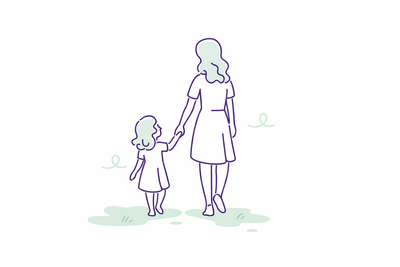
Oliver is going through a challenging phase: he cries a lot when we’re at home. I haven’t figured out yet if it’s because of lack of stimuli, general discomfort caused by teething, boredom of being always with mummy, a combination of all those things, or if it is, indeed, just a phase (which is most likely).
The problem is, his crying for no reason at all really gets on my nerves and, since the very beginning, it’s the one thing that can drive me completely nuts. I’m not talking about a little moaning, it’s real crying out loud, proper tantrum style. It drives me insane.
The most recent Montessori course I took was about the transformation of the adult, which is absolutely necessary in a Montessori environment—or any environment, in my opinion. Maria Montessori wrote in The Secret of Childhood:
The adult is part of the child's environment; the adult must adjust himself to the child's needs if he is not to be a hindrance to him and if he is not to substitute himself for the child in the activities essential to growth and development.
At the end of the course we all had to choose an aspect of ourself we wanted to improve and start working on: I chose patience and anger management, and I have to admit it’s been very hard, probably the hardest challenge this Montessori journey has given me so far.
So today, I’m going to give you the same challenge: start your own transformation, start working on something you struggle with in order to become a better parent for your children and a better person. Before choosing your challenge, I’ll quickly explain what the transformation of the adult means in Montessori and I’ll tell you a funny (in retrospect) anecdote about me.
According to the Montessori philosophy there are four aspects of transformation you have to undergo to become a Montessori guide (“guides” is how they call teachers in a Montessori school):
- Spiritual and emotional (which involves changing your attitude towards the child and life in general)
- Physical (which involves carrying out a healthy lifestyle, minding your tone of voice, avoiding being extravagant in your way of dressing)
- Intellectual (understanding the development of the child, which is a continuous learning precess)
- Technical (knowing how to use the materials and knowing when to intervene and when not to)
For a parent like you and me, though, I think the most important aspect—the one that will shape the relationship with our children—is the first one, the emotional one. Undergoing an emotional transformation means, among other things:
- Learning to trust our child and always give them the benefit of the doubt: Maria Montessori said that there's no bad child and I believe her; a child behaving badly is a sign that they have encountered an obstacle in their development and it's our job as parents to understand and help them figure it out.
- Learning to be patient, accepting the child's rhythm and being understanding when their behaviour doesn't meet our expectations.
- Learning to be perseverant when things don't go our way.
- Learning to be humble and admit our mistakes.
- Learning how to deal with anger ourselves in order to help our kids recognise it and deal with it.
- Learning to be active listeners, which is the first step to make somebody feel valued.
Now, before you commit to this, I want you to know that it’s going to be hard and you’ll fail over and over again. It is important you realise this is a slow transformation, one that will occur in years, so cut yourself some slack, don’t be too strict with yourself, admit when you fail and try to improve the next time. This is one of my recent failures.
Yesterday, I took Oliver to the playground. As every day, he fell asleep in the car, which means I can then put him to sleep, and have one or two free hours to cook a healthy meal and blog/relax/clean. Me time.
When we got home, I left the door open and went straight to his room, but as soon as I put him down all (all!) the doors in the apartment slammed because of the wind. He didn’t wake up. But then Colbie started barking because she was locked in one of the rooms. Oliver opened his eyes, I frustratedly rushed to shush Colbie, got back to Oliver and comforted him back to sleep. Against all odds, it worked.
But then the door I had left open slammed again. Oliver lifted his head, eyes wide open, but thanks to some sort of miracle he rested his head again and seemed to be going back to sleep. Which is when the neighbour rang the bell to let me know the door was open (duh?)! I frantically and angrily ran to the door, dismissed him not as politely as I could, closed the door and went back to Oliver. But this time it was too late, he was wide awake and I had just lost my me time.
I obsessively tried to put him back to sleep for about 20 minutes, but he just looked at me as I got more and more frustrated. I was very upset, I really needed that me time. I tried to calm myself down, took him to the kitchen and put him on his learning tower, but when I realised there was nothing to eat (I was very hungry by then!) I just started sobbing out of frustration, anger, disappointment.
You see, I might a bit overly emotional lately—a mix of pregnancy hormones, lack of quality sleep and struggling to adapt to our new reality—but I should not let myself get to that state of mind. It’s not good for anybody and it doesn’t make any situation better.
The next day, something similar happened and I was just as close to lose my me time again: but this I collected myself better (still not perfectly) and I patiently waited for Oliver to fall back asleep. And he did.
So this is what I’m working on. Patience and anger management.
Now, what’s your challenge? What do you want to improve of your being parent?
Parliamone
Hello, Carlotta, I absolutely agree with you that emotional aspect is very important treating with kids. Being mom and quite an impatient person by nature, it is a day to day struggle first of all with myself, with my character and personality, calming me down, learning to count up to ten and breathing deeply, trying in this way benefit in the relationship with muy little boy. It is not easy, but I am on the right way, though it will take time...
I really love your honesty in this post! Indeed, we are the ones who need to be trained in order to provide the kind of conscious parenting we, as Montessorians, aspire to. Finding the balance of nurturing ourselves while we strive to create optimal environments for our children is the key! That and kindness to ourselves and forgiveness for when we just do do any of it as planned!
I really feel that being supported by having our children in the Casa del Mar community will really create the opportunity to nourish all of these aspects simultaneously.
































